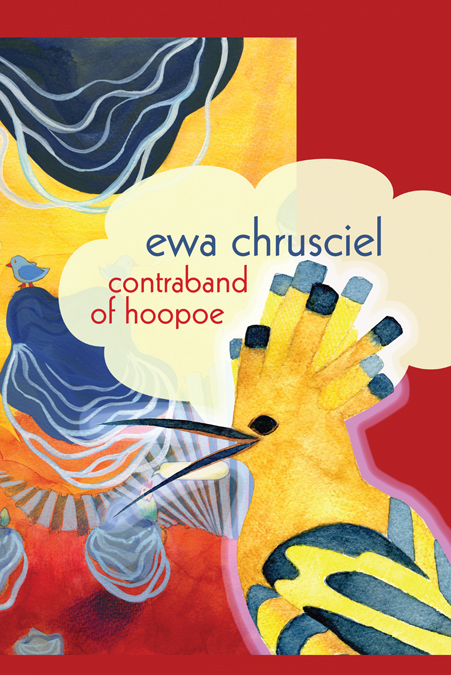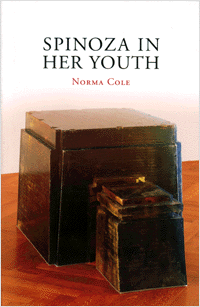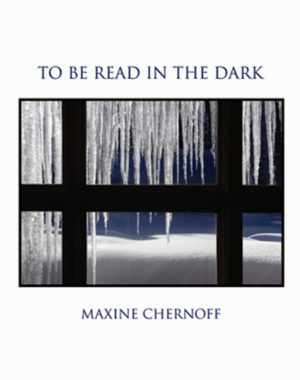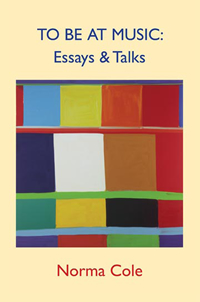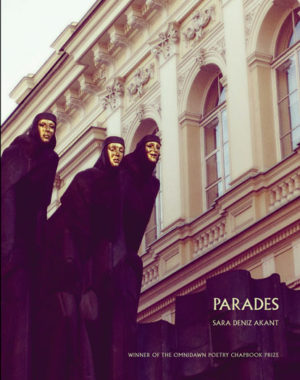Description
Contraband of Hoopoe is a series of braided poems and prose poems that interrogate the issues of dislocation, immigration and cross-cultural desire. Moving fluidly between the lucid and the ludic, Chrusciel invents a poetics of smuggling as she crosses national, historical and linguistic borders. The migratory narrative is thus distinctly errant, haunted as it is by a childhood lived under a Communist regime, by the austerity of Eastern block politics, and by the possibility of discovering a fleeting language in whose very excesses are carried the seeds of illicit revelation, spiritual transformation and insight. The book also elevates smuggling to a noble activity, recording how the Jewish people were hidden and transported during the Holocaust.
One of the guiding totems of the book is the hoopoe, that bird of exile and return, which King Solomon sent to the Queen of Sheba to convert her to his faith. Under the aegis of this mythical bird, Chrusciel tracks a series of historical objects, undeclared beliefs and secret messages that immigrants throughout history have been sneaking through customs, past border checkpoints, and across the seas. Out of the rollicking oscillation of these themes, Contraband of Hoopoe tells a distinctly postmodern story, woven from the lives of countless immigrants past and present, through the contingencies of a poet who has migrated from Poland to the United States.
The excitement one experiences reading the Polish and American poet Ewa Chrusciel’s new book is hard to describe. If one made an amalgam of Darwin, early Hejinian, Byzantine art, Near Eastern books of wisdom, Ponge, Pavese, sacred Hopi and Amerindian texts, one still wouldn’t be able to come up with the magical contraband this vessel is carrying. It is thrilling, wild and salvific. The book is written by an immigrant, and that immigrant is the human being. All is a source of wonder and horror to this species. It is looking everywhere for clues as to what borders are—what they are for, what happens when one breaches them, who does one become when one adopts the mannerisms, the habits, the intelligence of one’s hosts. What is the host. In poems seeking safe passage through institutions secular and transcendent, through signals given us by the natural world, by habit, custom, sign, disguise, these urgent works explode onto the American poetic landscape. Authenticity emanates from every word, as well as originality, sassy humor and bracing images, objects, rituals, and queries from cultures in every old world trying to find right translation into this so-called new one. I would listen closely to what the ancient and near-extinct Hoopoe conveys. It really knows something crucial.
Jorie Graham
This is a collection that knows no boundaries—in fact, it is wholly engaged in transgressing them, transforming them, transcending them. And Chrusciel makes ingenious use of birds to do this—the rukh, the hoopoe, and the hummingbird; the parrot, the partridge, and the bird of paradise. She uses the lines they inscribe on the sky to stitch together different ages, different spaces, and different dimensions, creating a marvelous convergence of the mythical and the remembered. She uses smuggling to do this too—a lot of smuggling. “I am crossing the borders with this coiffure of feathers.” She definitely has something up her sleeve.
Cole Swensen, author of Gravesend
Following up on the strong promise of Strata, Ewa Chrusciel returns with an impressive new volume that confirms her place as one of the most compelling and intellectually stimulating new poets.
Kazim Ali, author of Bright Felon
About the Author
Reviews
Excerpt
Ewa Chrusciel has two books in Polish: Furkot and Sopilki and one book in English, Strata, which won the 2009 International Book Contest and was published with Emergency Press in 2011. Her poems have appeared in many books and magazines in Poland, England, Italy, and the United States, including Jubilat, Boston Review, Colorado Review, Lana Turner, Spoon River Review, Aufgabe. She translated Jack London, Joseph Conrad, I.B. Singer as well as some contemporary American poets into Polish. She is an associate professor of humanities at Colby-Sawyer College.
A brief interview with Ewa Chrusciel
(conducted by Rusty Morrison)
The sound value of the book’s title makes it a delight to say aloud! But I know that both words, “contraband” and “hoopoe” in the title have great significance. Will you speak to them?
The hoopoe is an orange bird with white and black stripes and a spectacular crest. It can be found across Afro-Eurasia. One of its species, the Saint Helena Hoopoe, is already extinct. This bird is also a Biblical, mythological, and literary character. King Solomon sent the hoopoe to the Queen of Sheba to convert her to monotheism. The hoopoe could speak and he accomplished Solomon’s mission. It was also a hoopoe that led other birds on a pilgrimage to see the face of Mystery—Simurgh—in Attar’s famous Sufi epic, “The Conference of the Birds.” In 2008, the hoopoe was chosen as the national bird of Israel. The hoopoe happens to be, at the same time, a symbol of exile for the Palestinians. In his poem “Hoopoe,” Mahmoud Darwish says: “But, among us there is a hoopoe who dictates his letters to the olive tree of exile.” By now Mahmoud Darwish’s poetry has found its way to Israeli high schools. Therefore, the hoopoe continues its mission. He is the smuggler of sacred messages. By ceaseless cultural crossing, he is a peacemaker.
The hoopoe stands for the other, for the foreigner. It creates bewilderment. It transports us to new places. It changes us. That’s the secret contraband of this book; well, one of them. Edith Stein suggests that the other puts us in motion, so we actively go out of ourselves to meet the other. My book embodies this desire—the desire to face the poverty of spirit, the wounded and the vulnerable in us and outside of us. And that desire tends to be disguised. The noblest contraband dwells in fraintendimento, understanding in-between or, in other words, reading between the lines.
There are so many recurring references to both your personal history and to the histories of immigration in this text. Of course, in a short interview, we can’t discuss them all, but I’d love to ask you to talk about the Ellis Island poems, as well as the poems that delve into your past. How do you see these works interacting in the text?
The idea of connecting the Ellis Island poems with my past and present came from my constant packing and unpacking, crossing and re-crossing the borders. I had to constantly leave behind things and places I was attached to. I had to carefully select things I could take and what I would leave behind. There was also a growing awareness that the things we miss, or long for, are usually other desires in disguise. That personal experience led me to a question about immigration and the first immigrants who arrived at Ellis Island. I started to visit Ellis Island and the Tenement Museum in New York because I was interested in the objects of affections that the first immigrants carried with them. Then I got interested in the ideas they carried. The first face I saw when I walked onto Ellis Island was that of Al Capone. Ellis Island was featuring an exhibition on Alcatraz. That collision between Ellis Island and Alcatraz Island gave rise to new questions about immigration, in the past and nowadays.
In the end, I realized the poems I was writing at that time were tending towards the other/Other. They investigated the liminal spaces and the transgressive nature of our desire. In the Hebrew Bible, the stranger is always mentioned in conjunction with the orphan and the widow. Foreigners are people who cannot take anything for granted. Nothing belongs to them. To adopt Jorie Graham’s words: “They live in a perpetual state of adaptation and mercy. Their path is a ‘twisted’ one, a crooked path, the one that takes you off the expected path—the one Mercury, or Hermes, leads you towards—‘off road’, ‘off course.’” Words are also strangers, multilingual immigrants.
Can you speak to your poetic process? Your last book and this one both show your mastery of the prose poem form. Do you find this strategy to best enable you to invite in, and then expose, the kind of hidden ‘contraband’ that most actively engages and surprises your process? But you also lineate some poems, for instance, “Prayer Before Flight” and “All Souls’ Poem” and “Emergency Prayer,” to name a few. Can you also speak to this formal decision?
In “Lost in Translation”, Eva Hoffman claims that we can have a new beginning in a new language. We can be free of constraints and native inhibitions. We gain distance in the second language. We no longer can take ourselves that seriously.
Prose poetry comes naturally to me in English, even though I do not use this form often when I write in Polish. In English, I let my syntax meander in order to encounter the subject of my poems, in order to storm the walls of mystery. Prose poetry seems to be a good form, for the meaning is always dynamic and ongoing for such poets. It expands into new domains, as new projective structures arise.
I let my sentences explode, take off, expand. Writing in English requires a constant mental shifting and shuffling between the two languages, between these two different conceptualizations of the world. It is the work of smuggling metaphors. This is also why I oscillate between the prose poem and lineated poems. Perhaps the hidden contraband of this book comes from the refusal to linguistically renounce anything—the desire to keep both worlds, the desire for bilocation. The price is the ceaseless border crossing, smuggling.
Would you tell me a bit about yourself? Anything about you that is not in the bio printed in the book, and that might give insight into your more personal relationship to this text?
I grew up during the Communist Regime in Poland. I remember the lines in front of the shops to buy rationed food. When there is deprivation, contraband is born. Poles soon figured out what is worth smuggling out of the country and back into the country.
Most important, however, the censorship gave rise to intellectual and spiritual contraband. Polish writers had to invent their own code-language in order to cleanse themselves of the Newspeak imposed on them by the Stalinist and Communist Regime. The Communist establishment banned books that criticized the Soviet Union, or any books that undermined the glory of Russia in general. Books that showed the West as an attractive place were banned. In high school we smuggled quotes from Orwell’s “Animal Farm”: All animals are equal but some animals are more equal than others. My father was in Solidarity, and as a child I remember he was hiding some documents in a rabbit’s cage in our garden.
Perhaps the origin of writing is contraband. Writing somehow flourishes under the opposition, if not oppression. Compare this phenomenon to Kant’s pigeon—the atmospheric pressure that seems to hinder its flight makes it actually possible. Think of Hopkins’ windhover, which by hurling itself horizontally into the wind rebuffs it. Think of a kestrel which, buffeted by the wind, emerges out of the wind even stronger.
Who are the authors or artists or musicians with whom you feel a kinship? Who are you currently reading, watching, hearing?
When I grew up in Poland I mostly admired Zbigniew Herbert, Czesław Miłosz, Ryszard Krynicki, Tadeusz Różewicz, and Paul Celan. These poets showed me that poetry was like bread for the hungry. Generally, I am drawn to the poetics of omission, gaps, silence. Dickinson, Stevens, Bishop, Oppen. While I was completing my PhD and based in the US, I became interested in the poetics of A.R. Ammons, Hejinian, Jorie Graham, Cole Swensen, Ann Carson, and Rosmarie Waldrop. Now there are tons of contemporary poets who fascinate me: Fanny Howe, Charles Wright, Mary Ruefle, just to mention a few. Recently I got interested in the writings of self-taught Gypsy poet Bronisława Wajs, known as Papusza who lived in Poland from 1908 to 1987.
I am also a fan of Flannery O’Connor. A story is good, as O’Connor instructs us, when it “hangs on and expands in the mind.” I apply these words to poetry.
You chose the artist who created the image that is used in the cover design for this book. Can you talk about your reasons for your choice?
I met Julie Pütgen at a reading of mine in Vermont and she contacted me about one of my contraband poems, which she liked. I told her I wanted to write a book with an overarching theme of smuggling and she became interested in the project. In the meantime, I went to Julie’s exhibition and I become an admirer of her art. This is why I envisioned her for the cover of the book. Please check out her website: www.turtlenosedsnake.com
Polish poet Chrusciel (Strata) opens her strange, mesmerizing fourth collection—her second in English—by asking: “Can you feel the apparition?” The book is less a collection of discrete poems than a flowing lyric study on sheltering oneself in the face of many faces of death. That flow is periodically interrupted by 14 poems titled “Ellis,” each of which describes objects, concepts, and people that were carried by immigrants on their journeys to new countries. In between, the mostly untitled poems all begin with an image that eventually unspools into a meditation on religion and oppression: a prayer candle becomes a metaphor for anti-Semitism; St. George’s dragon becomes kudzu vines overtaking buildings and cities.
In these poems, we also find the pentimento in what is carried, evidence of what has been changed for the sake of transfer, for the sake of arrival in some new place. It is what lies below the surface, invisible but part of. Some of those carriers are immigrants and other human survivors, some are the dead. Some take the form of magical birds who flutter from the mouths of men or speak to other birds, or, as in the very first poem in the book, smuggle themselves through customs, inside the breasts of the speaker.
With its variety of form, content and spatial and temporal movement, contraband, offers up a world to be engaged with.
Ewa Chrusciel’s Contraband of Hoopoe is a volume of poetry that is both fascinating and thrilling to read. Ewa Chrusciel is a Polish immigrant to the United States. Her poems focus on the subject of immigration as an act by which one imports contraband or illegally smuggled goods into the new country. In this volume, the hoopoe, which is a bright bird with a crested head inhabiting Africa, Europe, and Asia, is the central example of contraband. In this series of mostly prose poems, Chrusciel also examines other kinds of smuggling, such as the smuggling of food or even ideas as an immigrant enters a new country.
Repeating figures, hoopoes are found in Africa, Asia and Europe. They are found in Leviticus 11:13–19 where their detestable taste is decried. They are found in Sufi literature and throughout this book, where a hoopoe nestled in the chest is the poet’s immigrant heart. “The hoopoe is the dybbuk messenger chattering under my bra” (13). A sausage is also held close to her heart, “transcontinental dowry,” emblematic of Poland (14). Threads of Hoopoes from biblical sources (Solomon and Sheba) to fables invented for nonce effect synthesize an intriguing unity of construction. Appearances of unity and deep coherences are often found in different registers, humorous postmodern campiness often at odds with deep coherences addressed to the human condition, not here. Contraband of Hoopoe works in both registers.
Ewa Chrusciel’s second collection of poems in English (she has also written two in Polish) is a beckoning into borderlands populated by smugglers, saviors, saints, apparitions, and a playful array of avian life. By the end of the book, the accretion of crossings into foreign lands is revealed to be not just the milieu of a dispossessed and fringe few, but the very engine of cultural and social advancement.
I’m absolutely fascinated by Polish American poet and translator Ewa Chrusciel’s fourth poetry collection, Contraband of Hoopoe (Richmond CA: Omnidawn, 2014). The author of two poetry collections in Polish—Furkot (Studium Press, 2003) and Sopitki (Fraza Press, 2009)—and one previous book in English—Strata (Emergency Press, 2011)—her Contraband of Hoopoe writes out a collage of poems as lyric segments of a single, extended poem sketched out as lyric journal entries.
Imbued with the aching linage of immigrants, Ewa Chrusciel’s contraband of hoopoe is as astonishing as it is honest. Chrusciel’s bright plumage of language builds an ever-displaced nest for her readers in what manifests as pastoral of the relocated other.
It’s not a difficult thing to think that at a poetry festival, you might hear a poem that piques your interest. It’s an entirely different thing to hear something– a way of offering words to a subject of already well-tilled ground in a fresh voice that makes you beeline to the bookfair area and snatch up the sole remaining copy of that poet’s book. And so it was that I met Ewa Chrusciel, first through her reading from A Contraband of Hoopoe… I’ve read this collection several times and each reading offers new nuggets of insight. At the heart of Hoopoe is a collection exploring the immigrant experience. This focus on immigrants coming to the U.S., feels particularly pressing and timely right now, one to be kept on the front burner.
Ewa Chrusciel’s Contraband of Hoopoe is a volume of poetry that is both fascinating and thrilling to read. Ewa Chrusciel is a Polish immigrant to the United States. Her poems focus on the subject of immigration as an act by which one imports contraband or illegally smuggled goods into the new country. In this volume, the hoopoe, which is a bright bird with a crested head inhabiting Africa, Europe, and Asia, is the central example of contraband. In this series of mostly prose poems, Chrusciel also examines other kinds of smuggling, such as the smuggling of food or even ideas as an immigrant enters a new country.
Sonja James, published in Weekender section of The Journal (West Virginia)
Policed borders establish a hierarchy in which some bodies are more valued than others. When an immigrant crosses a border with contraband under her clothes, can the smuggled object whisper to her of her own worth, even as border authorities parse her with scrutiny? Contraband of Hoopoe explores smuggling as a triangulation of desired material objects, borders governed by an authority that fears contamination, and a body willing to risk itself by carrying contraband.
We take the turf with us. We take the dirt with us. We smuggle
mortality. We smuggle the dust. We carry the clay. We make the words
out of little clumps of earth where all the word-roots of words are.
Where the lines of poems spring from. Isn’t it bacteria that turned
the water into wine? To thy high requiem become a sod. Scatological
belongings, we transmit literature through toilets. The turf is soaked
with the metaphors of our country. The turf translates bones, not to be
broken. The gas of our ancestors. It is a bomb. It sizzles. Do you see a
mulberry tree in a mustard seed? We will cover the seed with our soil.
We will transplant the seeds in rows 12 inches apart.

